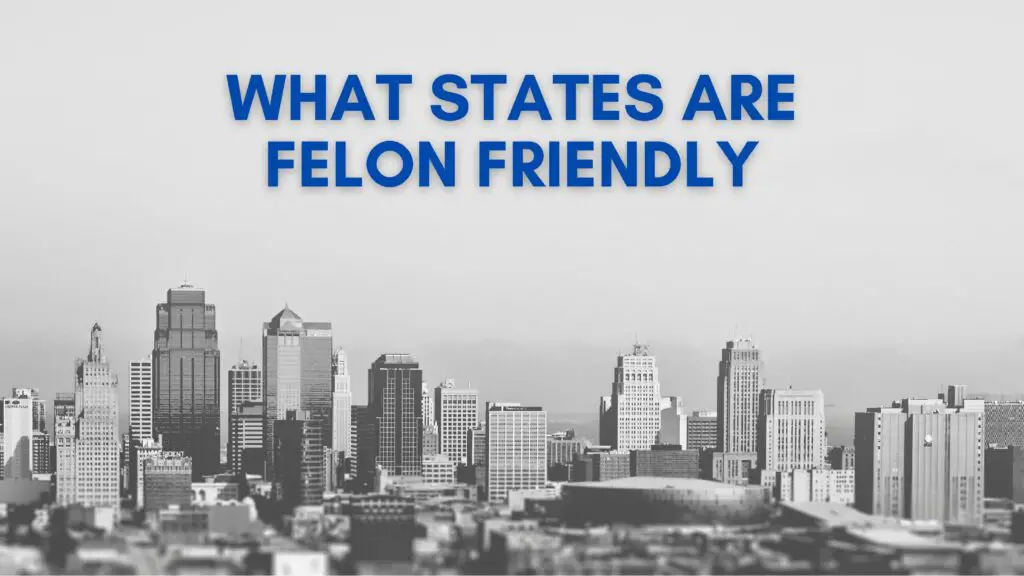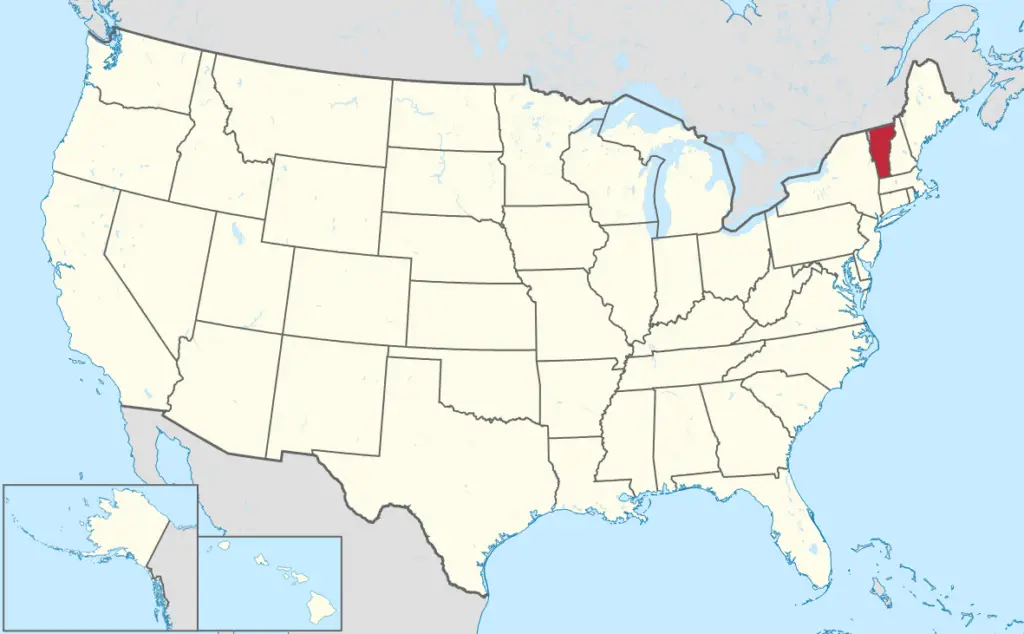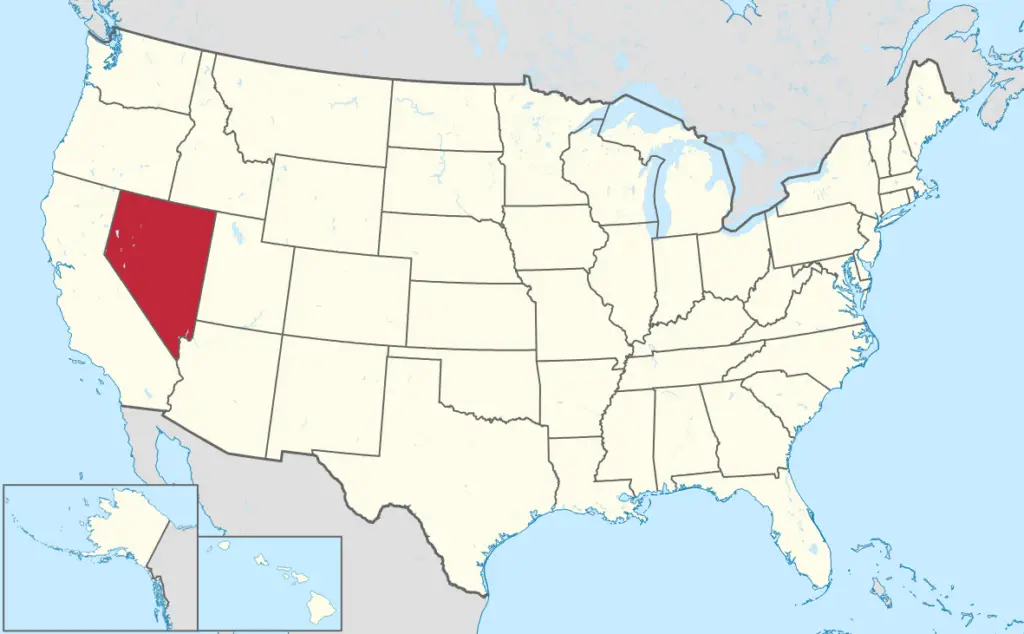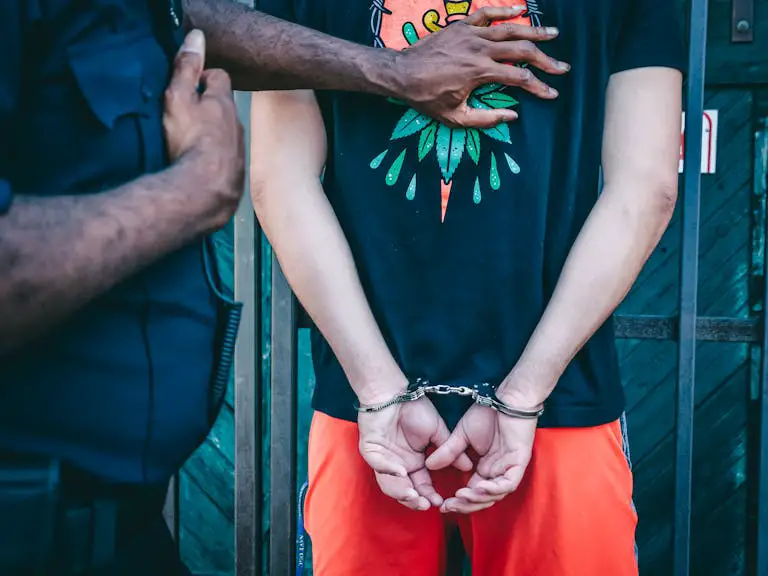Which States are the Best for a Convicted Felon? (3 Strike Felony Rule)
Introduction
Whether we admit it or not, surroundings have a huge impact on the quality of our lives – and sometimes they will contribute to happiness, while other times they could leave one feeling unfulfilled, unmotivated, and despondent.
When an individual is put under the right circumstances, in the right environment, the odds of success increase greatly.
Conversely, being exposed to a bad environment (in the forms of crime, limited employment opportunities, little to no housing, inaccessibility to programs and support), can hurt the way we feel about life and the overall outcomes for this individual.
So we can establish and agree, that where you live matters – but it is critical when one happens to be a convicted felon and is trying to avoid the threat of recidivism every step of the way.
Which States Are Best For a Convicted Felon with Prior Felony Convictions and the Role of The Three Strikes Law?
The best places for a convicted felon would be based on the individual felon’s needs and situation. We should understand that the life of someone convicted of a felony is loaded with unique challenges not experienced by the general population at large, so ideally, the best states would be able to provide job opportunities, safe and affordable living environments, and access to resources like government assistance, educational opportunities, and a restoration of rights.
Additionally, states with more lenient approaches to the Three Strikes Law or those that have reformed their policies can be particularly beneficial for individuals with multiple felony convictions.
How Does Where You Live to Affect Things As Someone With Prior Convictions?
For the convicted felon, where you live is extremely important and could make the difference between overcoming daily challenges – or being in violation, thus ending up with the individual incarcerated (again).
Where you live influences how humans live in so many different ways. The main interactions between humans and their environment can be based on the use of resources and the profound effect it has on your circumstances.
Psychologists have long concluded that people’s surroundings can influence their overall moods and mental health. For the convicted felon, just waking up in the morning is a true accomplishment, and regardless of the environment, the challenges are constant and never-ending.
For many felons, their sentence continues long after their time was served. After release, felons often struggle to find gainful employment and in some states can even be denied the right to vote.
While some states have passed laws preventing employers from asking about your criminal background on job applications and have made progress in assisting felons integrate back with society, others still have further to go, as some states in particular offer particularly bleak opportunities for the convicted felon.
In so many words, not every area is the same, as there would not be the same hardships afforded by living in an area more open, accepting, and tolerant of the life choices of an individual with a criminal background.
At the very least, the hardships would be greatly reduced by migrating to a more “felon friendly” environment.

Which States Are Felon-Friendly for Felony Conviction?
Most states have harsh rules and restrictions that put limitations on the opportunities that are obtainable by someone convicted of a felony. Although each state independently has its respective laws to adhere to, by nature, many have strong shortcomings when it comes to assisting convicted felons get back on their feet.
While this may be the norm, there are certain states where a convicted felon has a better chance. Put another way, “second chance” states make it possible, and accessible for an opportunity to be made available for a convicted felon.
In totality, the below-referenced states offer a means for someone who has been in contact with the criminal justice system and illustrates the broad differences in available opportunities as opposed to the lesser “felon-friendly” states.

VERMONT
- The most friendly state for felons is Vermont, where no felons are disenfranchised and no voting restrictions apply, as even those incarcerated are allowed the right to vote.
- Vermont is a “Ban the Box” state, where employers will be prohibited from asking about an individual’s criminal history record on initial employment applications.
- Bear in mind, that employers can still ask about a prospective employee’s criminal history record during a job interview or once the applicant has been deemed otherwise qualified for the position.
- Under the law, if an applicant divulges criminal history in response to an employer inquiry, the employer is required to offer that applicant the opportunity to explain the circumstances, including any post-conviction rehabilitation, if the criminal history record does not disqualify the applicant under federal or state law.
- The FCRA controls how far back pre-employment background checks can go in Vermont. Under the FCRA, there is a seven-year lookback period that restricts the following information from being reported when it is seven or more years old for positions paying less than $75,000.
- Although a contentious issue, Vermont’s state laws allow for non-violent felons to own guns. Keep in mind, there is a federal statute that prohibits felons from owning guns.
- Vermont’s state constitution guarantees people the “right to bear arms for the defense of themselves and the state.” The state has few laws restricting ownership or possession of firearms. There are no permitting, registration, or licensing requirements in the state
- Importantly, Vermont does not have a Three Strikes Law. This means that repeat offenders in Vermont don’t face the harsh mandatory sentences that are common in states with such laws, potentially offering a more rehabilitative approach to criminal justice.
CALIFORNIA
- California is a felon-friendly state because it places fewer limitations than most other states when it comes to employment. Although there are some exceptions, such as certain positions in health care and the state justice department, a felon can apply for any job in the state.
- California’s Three Strikes Law, enacted in 1994, imposes harsher penalties on repeat offenders with prior felony convictions, particularly for violent felonies.
- However, in 2012, California voters approved Proposition 36, which revised the Three Strikes Law to impose a life sentence only when the third felony conviction is “serious or violent.” This reform has significantly reduced the number of individuals facing life sentences for non-violent offenses.
- Felons do not face salary caps and are also protected by several laws that determine how an employer is to act regarding the hiring process of someone convicted of a felony.
- These include a seven-year rule, which prevents employers from looking more than seven years into an applicant’s conviction history when conducting a background check.
- The state also has fair housing laws. These laws require landlords to obtain written consent from a potential tenant before they conduct a background check.
- Landlords can still refuse to rent to a felon in most cases. However, they cannot create blanket policies that lead to the automatic refusal of a felon. Each tenant must be considered individually to ensure the landlord does not discriminate, intentionally or otherwise.
- California Department of Corrections and Rehabilitation (CDCR) Long Term Offender Reentry Recovery Program (LTORR) provides safe housing, meals, job, mental health services, and life skills training for parolees released from long-term incarceration. This program is particularly important for those affected by the three strikes law.
- Education is also accessible in California. The state has many programs in place to help felons to earn a degree and find work. These include, but aren’t limited to, the Jail to Jobs Program, The National HIRE Network, and Second Chance.
- Although you are generally not allowed the right to vote in any local, state or national election while incarcerated, on parole, or under supervision, California automatically restores this right when you have completed all terms of your sentence and probation.

MASSACHUSETTS
- Massachusetts is also a “ban-the-box” state, and state law prohibits employers from considering an applicant’s criminal records during an initial job application. This law has some exceptions, such as positions that would result in the presumptive disqualification of an applicant with a criminal record.
- Unlike many states, Massachusetts does not have a Three Strikes Law. This absence of mandatory sentencing for repeat offenders can be particularly beneficial for individuals with multiple felony convictions, as it allows for more judicial discretion in sentencing.
- The Massachusetts Parole Board operates regional reentry centers across the state. These centers help inmates make the transition from prison to the community.
- Staff will help released inmates get food assistance, obtain a state I.D. card, renew a driver’s license, open a bank account, find work, and find counseling. These centers are open to released inmates with no post-release supervision.
- The program is also available to former inmates at any time after they are released. These centers provide crucial support for offenders convicted of serious crimes as they transition back into the community.
- MassHealth – The MassHealth program is made up of the federally funded Medicaid program and the Children’s Health Insurance Program. MassHealth provides those with a low-income obtain health care. The program will pay for such things as doctor visits, hospital stays, dental work, and prescription drugs. To qualify, you have to show you have a low income, and you have to be a citizen or legal alien.
- There are numerous legal aid programs there to assist such as;
- Harvard Prison Legal Assistance Project – A student practice organization in which students represent inmates in Massachusetts prisons. PLAP student attorneys argue at disciplinary hearings on behalf of prisoners charged with violating prison regulations. PLAP students also argue before the Massachusetts Parole Board for prisoners facing parole revocation or rescission and second-degree life sentence hearings.
- In addition, PLAP provides inmates with assistance in matters ranging from civil rights violations to confiscated property.
- Legal Services Center – The Legal Services Center has a long record of providing exemplary legal services to address the unmet needs of low-income families in Greater Boston.
- Massachusetts Bar Association Lawyer Referral Service – Callers are given a referral to a member of the Massachusetts Bar Association (MBA), if appropriate, or are referred to an MBA public service program, a state or local agency, or a legal services agency for possible free representation. All calls are screened for income. Referrals to MBA attorneys are based on legal need (on both criminal and civil issues), geographic convenience, and the caller’s financial situation.

NEW YORK
- New York is a state that enacts measures for criminal justice reform and a restoration of one’s rights. Therein, there are protections against employer discrimination, as state law requires employers with whom someone has applied to consider several factors, including whether they have a Certificate of Relief from Disabilities or a Certificate of Good Conduct.
- While New York does not have a traditional Three Strikes Law, it does have a “persistent felony offender” statute. However, this law allows for more judicial discretion than typical Three Strikes Laws, potentially offering better outcomes for repeat offenders who show signs of rehabilitation.
- Also, employers are forbidden to ask about or consider arrests that did not lead to a conviction.
- The general rule of New York is that you can vote after incarceration for a felony conviction, or while you are on parole or probation. In these cases, your voting rights are automatically restored, but you have to re-register in order to vote. You do not need any special documentation to register.
- The statewide jail population decreased by more than 30 percent after the implementation of bail reform laws, expanding pre-trial release for a variety of misdemeanor and felony charges.
- Firearms rights are lost upon conviction of a felony or “serious offense”, however, rights may be regained by a pardon, or by a Certificate of Relief from Disabilities or Good Conduct.
- Parolees are eligible for the Certificate of Good Conduct even if they have been convicted of more than one felony. The Certificate of Good Conduct is available to individuals with previous felony convictions who have demonstrated good conduct.
- A Certificate of Good Conduct is also available to persons convicted outside New York, including federal offenses. It is granted only if the person has demonstrated “good conduct” for the requisite period and if (like the CRD) granting relief would be “consistent with the rehabilitation of the eligible offender” and “consistent with the public interest.”
- In 2018, New York City launched “Jails to Jobs”, a citywide reentry initiative focused on providing paid transitional employment, job training, access to higher education, and supportive services to approximately 5,000 justice system-involved individuals. The program was created to help prevent recidivism and ensure that people leaving jail have opportunities to embark on a productive and stable future.
- In 2022, the initiative expanded further to also provide holistic reentry services to individuals returning to NYC from state prisons. This expansion includes discharge planning prior to release from prison, transportation from prisons to nonprofit service provider organizations in the community, and an array of existing vocational, educational, and therapeutic services. The initiative, now called the Community Justice Reentry Network, serves approximately 8,000 people per year.

NEVADA
- Nevada has a seven-year limit in place for criminal background checks. Furthermore, the state has no salary caps, meaning there are no limits on a felon’s earning potential. However, there are no laws preventing businesses from using a felony conviction as a reason not to hire somebody.
- Nevada has a modified version of the Three Strikes Law, known as the “habitual criminal” statute. Under this law, individuals with multiple felony convictions can face enhanced sentences. However, unlike some stricter Three Strikes Laws, Nevada’s version allows for more judicial discretion in sentencing, potentially offering better outcomes for individuals showing signs of rehabilitation.
- Still, though, felons have multiple options in the job market, with major second-chance employers like UPS having been known to hire felons in Nevada. The state also allows felons to start their own business
- However, there are several programs available to help people to find felon-friendly housing options. One example is Hope for Prisoners, which maintains a list of felon-friendly housing and offers direct support to those looking for a permanent residence.
- Nevada stands out from many other states in regards to its voting laws, as it allows any felon who has completed their prison sentence to vote, even if they are on probation or parole. Furthermore, this right to vote is automatically instated upon the felon’s release.
- Felons convicted of violent crimes are also allowed to vote upon completion of their sentence. Felons may still need to re-register to vote if their registration was canceled when they were convicted.
- Felon education is also a key concern in the state, with many organizations offering educational programs. The previously mentioned Hope for Prisoners has several services, including financial training. WestCare offers vocational training while RISE provides several educational and employment programs.
- Until now, sealing past convictions of any offense has been a lengthy, complicated, and expensive process, however, a new law passed by the Nevada legislature and signed into law streamlines the process of sealing records of convictions for acts that have later been decriminalized.
- The new law, referred to by its sponsor as the Nevada Second Chance Act, requires the person convicted of the offense to send a written request to the court that originally convicted them, requesting the sealing. If the prosecuting attorney has no objections to the sealing, the court will grant the request.
Conclusion – Which States Are Best For A Convicted Felon and the Three Strikes Law?
Once again, our surroundings play a huge role and are extremely important. It affects things – like our circumstances. And circumstances do matter – especially when you are a convicted felon.
We try to adapt to our environment, we learn to interact with it, use it more efficiently, and in some cases even modify it to meet our needs and challenges. But at the same time, one should never underestimate the opportunity afforded one, when changing that environment and what it would do for your quality of living and lifestyle.








2 Comments